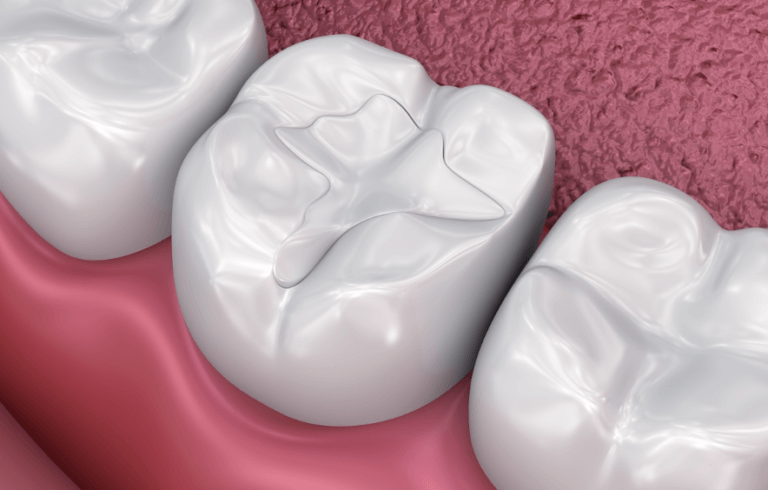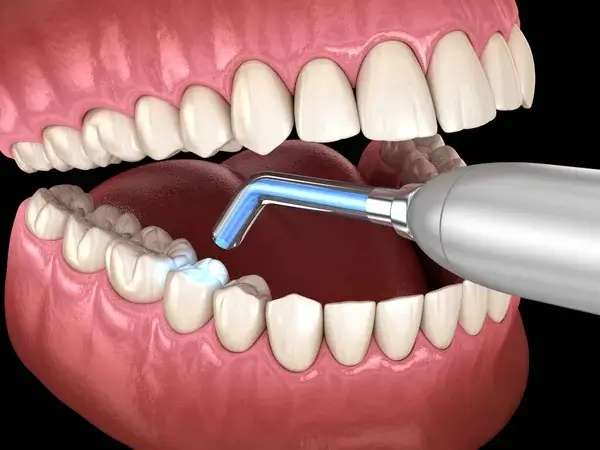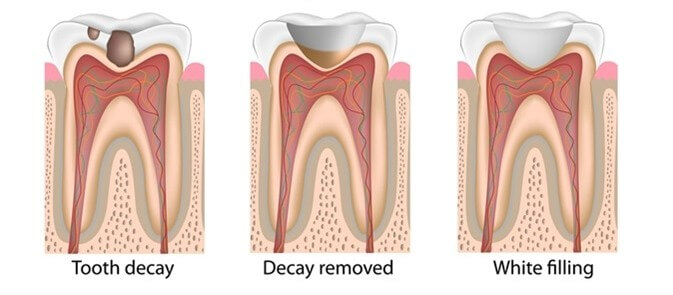Composite Resin Filling

What Is A Composite Resin Filling?
A Composite Resin Filling, often called a tooth-colored filling or white filling, is a modern solution for repairing teeth affected by cavities, minor chips, or fractures. Unlike traditional silver amalgam fillings, composite resin fillings are designed to blend seamlessly with the natural color of your teeth, providing a discreet and natural-looking result.
These fillings are made from a mixture of durable plastic and fine glass particles, which together mimic the appearance and strength of natural enamel. Composite resin fillings are highly popular due to their aesthetic advantage and the ability to bond directly to the tooth structure, ensuring a durable restoration.
Before deciding on whether a Composite Resin Filling are right for you, there are some things you should know:
- Who Needs A Composite Resin Filling?
- Benefits of Composite Resin Fillings
- How Much Does A Composite Resin Filling Cost?
- Steps In The Composite Resin Filling Procedure
- Alternative Treatments for Composite Resin Fillings
- Frequently Asked Questions About Composite Resin Fillings
If you have any further questions about A Composite Resin Filling or other dental services offered at Atlas Dental, please contact us.

Free phone consultation
Have questions about tooth fillings? Schedule a free phone consultation with our Toronto dentist.

5 star google reviews
Our patients love us! See for yourself why more and more people are choosing Atlas Dental for their dental fillings.

Book Emergency tooth filling
Do you think you have cavities and need an appointment? Book an emergency tooth filling online.
Who Needs A Composite Resin Filling?
Composite resin fillings are suitable for various dental concerns:
- Cavities: Composite resin fillings effectively treat tooth decay in both front and back teeth by restoring the tooth’s strength and appearance.
- Chipped or Fractured Teeth: They are ideal for repairing minor chips or fractures, especially in visible areas like the front teeth.
- Worn Teeth: Teeth worn down from teeth grinding or aggressive brushing can be restored with composite resin, helping to protect them from further damage.
- Replacing Old Fillings: If you have worn or discolored fillings, replacing them with composite resin can improve both the appearance and longevity of your restoration.
- Cosmetic Improvements: Dentists can use composite resin for cosmetic bonding to fix small gaps, irregular shapes, or uneven edges for a more polished smile.
It’s important to note that the suitability of composite resin fillings depends on the specific condition of your teeth and the recommendations of your dentist. If you have further questions about Composite Resin Fillings, please contact us.
Benefits of Composite Resin Fillings
There are numerous benefits to choosing composite resin fillings:
- Aesthetic Appeal: Their tooth-colored appearance makes them nearly invisible in your smile.
- Minimal Tooth Removal: Less healthy tooth structure needs to be removed compared to amalgam fillings.
- Strong Bonding: Composite fillings bond directly to your tooth, making them durable and long-lasting.
- Versatility: Suitable for a variety of dental issues, including cavities, chips, and worn teeth.
- Reduced Sensitivity: Unlike metal fillings, composite resin fillings do not conduct temperature changes, leading to less post-treatment sensitivity.
- Holistic and Biocompatible: Composite fillings offer a mercury-free, biologically-safe dental solution that promotes overall oral health and eliminates risk of heavy metal allergies or sensitivities.
Your dentist will carefully evaluate your dental health, discuss your preferences, and recommend the best treatment plan tailored to your specific needs and circumstances. If you have further questions about Composite Resin Fillings, please contact us.

Cost of Composite Resin Fillings
Routine Dental Fillings cost $207-477 depending on the location of the tooth (anterior, bicuspid or molar), as well as the number of “surfaces” involved. Imagine each tooth as a 5 surface box. Each “surface” of this imaginary box will dictate the size (and cost) of the tooth filling. The codes relevant to regular dental fillings in the Ontario Dental Association’s Suggested Fee Guide appear as follows:
Permanent Anteriors:
- 23111 – One surface: $205
- 23112 – Two surfaces: $256
- 23113 – Three surfaces: $308
- 23114 – Four surfaces: $379
- 23115 – Five surfaces (maximum surfaces per tooth): $400
Permanent Bicuspids:
- 23311 – One surface: $226
- 23312 – Two surfaces: $283
- 23313 – Three surfaces: $339
- 23314 – Four surfaces: $414
- 23315 – Five surfaces or maximum surfaces per tooth: $435
Permanent Molars:
- 23321 – One surface: $246
- 23322 – Two surfaces: $308
- 23323 – Three surfaces: $369
- 23324 – Four surfaces: $451
- 23325 – Five surfaces or maximum surfaces per tooth: $477
Regular Dental Fillings are considered a basic service under all dental insurance plans and should be covered to your maximum insurable limit, but be sure to find out from your dental insurance plan provider how much you are eligible for before going ahead with dental treatment. Our fees are consistent with the ODA Fee Guide.
For patients without dental insurance, Atlas Dental is pleased to offer dental financing through iFinance Dentalcard. Affordable payment plans start at 7.95% for terms of 6 months to 6 years. To learn more about Dentalcard dental treatment financing, follow this link.
Steps In The Composite Resin Filling Procedure
Here’s what to expect during a composite resin filling procedure:
- Examination: Your dentist will conduct a thorough examination, possibly including digital dental X-rays.
- Anesthesia (Optional): Local anesthesia may be administered to numb the area.
- Tooth Preparation: The decayed or damaged part of the tooth will be removed.
- Bonding: The tooth will be etched and coated with a bonding agent to prepare for the filling.
- Filling Placement: Composite resin is applied in layers and hardened with a curing light.
- Sculpting and Polishing: The dentist will shape and polish the filling to match your natural tooth.
- Bite Adjustment: Any necessary adjustments will be made to ensure your bite feels normal.
The entire composite resin filling procedure is usually completed in a single dental visit, making it a convenient and efficient option for restoring your teeth. If you have further questions about Composite Resin Fillings, please contact us.

Alternative Treatments for Composite Resin Fillings
If you’re not sure about composite resin fillings, here are other options:
- Glass Ionomer Fillings: These release fluoride to prevent future decay, making them a good option for small cavities, especially in children.
- Amalgam Fillings: Strong and durable but less aesthetically pleasing due to their silver color.
- Porcelain Inlays/Onlays: These are custom-made for a perfect fit and offer excellent durability and aesthetics.
- Dental Crowns: Used for more severe damage, crowns cover the entire tooth for comprehensive protection.
- Dental Veneers: Veneers are thin porcelain or composite resin shells placed over the front of the teeth to correct cosmetic issues like chips, discoloration, and gaps.
Your dentist will consider factors such as the location and size of the restoration, your oral health, aesthetic goals, and budget to recommend the best alternative treatment for achieving a healthy and beautiful smile. If you have further questions about Composite Resin Fillings, please contact us.
Frequently Asked Questions About Composite Resin Fillings
- How long do composite resin fillings last?
With proper care, composite fillings can last 7-10 years or longer, depending on their size and location.
- Is the procedure for composite fillings painful?
No, the procedure is typically painless as local anesthesia is used to numb the area.
- Are composite fillings safe?
Yes, they are mercury-free, biocompatible, and a safe alternative to traditional metal fillings.
- Do composite fillings stain over time?
While durable, composite fillings can stain slightly with excessive coffee, tea, or tobacco use.
Composite resin fillings are a durable, natural-looking solution for restoring your smile. If you have further questions about Composite Resin Fillings, please contact us.

